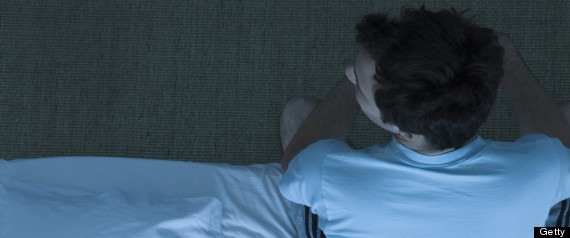
![]()
By Jennifer Warner
Medically reviewed by Farrokh Sohrabi, M.D.
Does your mind race as soon your head hits the pillow? Does anxiety over work, money, or relationships keep you from going to sleep?
It's normal to be anxious from time to time. But when anxiety and emotional problems routinely get in the way of a good night's sleep, it's time to take action before a potentially dangerous cycle begins.
"It's really like a circular pattern -- emotional problems can affect sleep, and lack of sleep can affect people's emotions," said David Neubauer, M.D., an associate professor of psychiatry and behavioral sciences at Johns Hopkins Medicine and associate director at the Johns Hopkins Sleep Disorders Center in Baltimore, Md. "There is quite a bit of overlap between symptoms of insomnia and anxiety and other mood disorders."
How Anxiety Affects Sleep
Sleep problems caused by anxiety aren't limited to people with diagnosed anxiety disorders.
"The spectrum ranges from everyday kind of problems that might make us anxious and affect sleep all the way to people diagnosed with anxiety disorders who are likely to have ongoing problems," Neubauer said.
Anxiety can affect sleep at any time, but most commonly causes difficulty in falling asleep. People with higher levels of anxiety may feel anxious all the time and have trouble staying asleep. In general, Neubauer said, the risk for awakening in the night parallels the degree of anxiety.
"People with persistent insomnia also become anxious about sleep," he said. "The more anxious they are about sleep, that undermines the ability to sleep well, and it becomes a self-fulfilling prophecy."
In fact, a June 2013 study in the Journal of Neuroscience suggests that sleep deprivation contributes to anxiety by heightening people's anticipatory and stress-inducing response processes.
Easing Anxiety Improves Sleep
The good news about anxiety and insomnia being so closely related is that, if you help one problem, you also help the other.
For example, Neubauer said, if you have an anxiety disorder, then getting treatment with cognitive therapy, meditation, or medication can have the indirect effect of improving sleep.
"Short of getting treatment for an anxiety disorder," said Neubauer, "there are ways people can, on their own, sleep better." For instance:
Practice relaxation techniques. Many approaches, such as nighttime meditation or yoga, can combat anxiety. Neubauer recommends you start by learning new relaxation techniques earlier in the day so you're not putting too much pressure on yourself before bedtime. Then, once you're comfortable with it, you can do it later in the day.
Get into a regular sleep routine. Going to bed and getting up at about the same time each day lets the body's internal circadian clock work better. Getting up at odd hours can undermine that rhythm.
Schedule some idle time before bed. "A common problem is that, when people get into bed, it's the first time they've had to ponder the day," Neubauer said. Try to sit down and think about the day before you get ready for sleep. Jot down any concerns on a piece of paper if you need to remember tasks for the next day. Don't use the time before bed to pay bills or other anxiety-inducing activity.
Cut out screen time. "It's not a great idea to sit in bed with a tablet or screen and then try to fall asleep," he said, adding that research has shown that the blue light in most electronic screens has the most potential to influence and delay the body's natural circadian rhythms, making it harder to fall asleep.
Limit alcohol and caffeine. Having a glass of wine to help you get to sleep may be counterproductive. "Sleep after alcohol tends to be lighter, more disrupted, and less refreshing," Neubauer said. Caffeine also can stay in your system for several hours, so avoid it later in the day if you're having trouble going to sleep.
Don't dwell on anxiety or emotional issues that are keeping you from falling asleep. It can be self-reinforcing and put too much pressure on trying to fall asleep. If you're feeling anxious in bed, get out of bed and do something else, like reading or yoga.
Good sleep hygiene habits, like using your bedroom only for sleep and sex -- not work or TV -- and sleeping in a cool, dark, and quiet room equipped with some white noise if needed, can make it easier to fall asleep. But, if you still have persistent sleep problems caused by anxiety, talk to your doctor about treatment.
"Falling Asleep with Anxiety"[1] originally appeared on Everyday Health
References
- ^ "Falling Asleep with Anxiety" (www.everydayhealth.com)
- ^ Send us a tip (www.huffingtonpost.com)
- ^ Send us a photo or video (www.huffingtonpost.com)
- ^ Suggest a correction (www.huffingtonpost.com)

0 comments:
Post a Comment